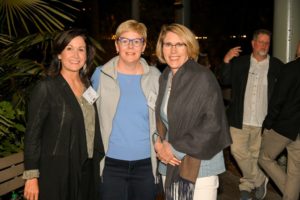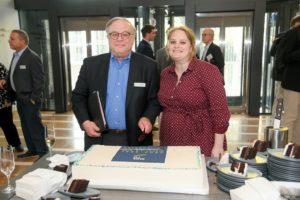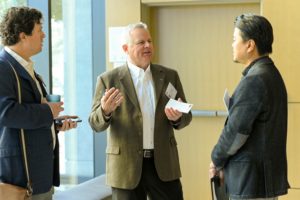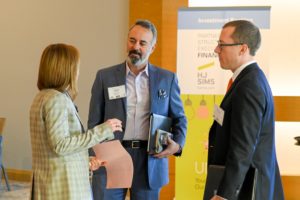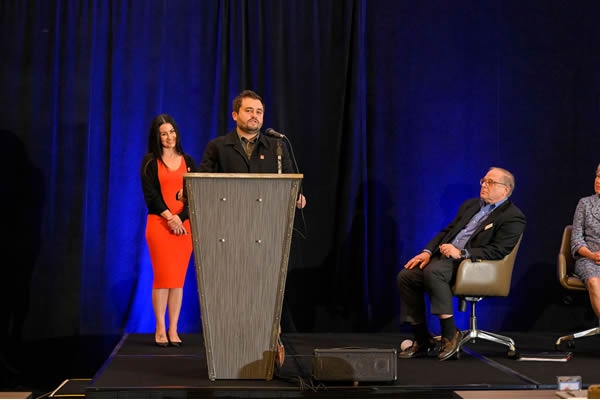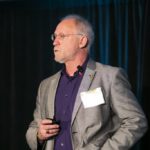HJ Sims successfully completes $6.6 million of Tax-exempt and Taxable Revenue Bonds to position Samaritan Housing Foundation, Inc., d/b/a Searstone Retirement Community, a life plan community located in Cary, NC, for accretive Phase II.
Continue readingLinks Funding II
HJ Sims provides a customized acquisition financing structure for Links Healthcare Community in California, which helps Links with both its short and long-term financing needs. By maximizing leverage, Links is able to preserve capital for future growth and support of its communities.
Continue readingAdvance Refundings
Consider Supporting the Reinstatement of Advance Refundings
Advance refundings are a critical tool to help state and local governments and 501(c)(3) organizations lower their debt costs.
Nearly three years ago, advance refundings were eliminated as part of the Tax Cuts and Jobs Act of 2017. At the time, the assumption was that the borrowers of tax-exempt bonds used to finance advance refundings would access the taxable bond market if an advance refunding was necessary. While taxable advance refunding volume has increased over the past two years, non-rated borrowers and smaller advance refundings have been essentially locked out of the taxable bond market.
Taxable municipal bond investors are not as prolific as tax-exempt municipal bond investors. The taxable muni market tends to focus more strongly on rated credits with considerable size. This leaves non-rated conduit borrowers, especially non-rated 501(c)(3) institutions like rural hospitals, universities and senior living communities at risk because they do not have access to the same markets to refinance higher coupon debt.
On July 1, 2020, eight bipartisan senators came together to introduce the LOCAL Infrastructure Act that reinstates advance refundings as a critical tool to help state and local governments and 501(c)(3) organizations lower their debt costs. Senators Roger Wicker (R-MS), Debbie Stabenow (D-MI), Michael Bennet (D-CO), Shelley Moore Capito (R-W.Va.), John Barrasso (R-WY), Bob Menendez (D-NJ), Jerry Moran (R-KS), and Tom Carper (D-DE) cosponsored the legislation. There is also legislation in the House that includes the reinstatement of advanced refundings. In light of this, we believe that now may be the best time to restore advance refundings.
How Can You Take Action
Write a letter to your U.S. senator appealing for their help to restore advance refundings through the Senate Finance Committee bill. Help the eight senators who have already come together to co-sponsor the LOCAL Infrasturcture Act.
The draft letter below is written from the perspective of a board member or officer at a non-profit senior living community.
Letter Text
Greetings,
I am a constituent of the Senator and the [_________________] of [____________________], a senior living community in the Senator’s state. I understand a bipartisan group of senators led by Mr. Wicker of Mississippi recently introduced the LOCAL Infrastructure Act, which would restore advance refunding bonds, and I would like to encourage the Senator to consider the legislation and assist in its passage in the Senate.
Use of tax-exempt advance refunding bonds has not only saved state and local governments billions of dollars, but it has also provided 501(c)(3) senior living communities similar to ours the opportunity to refinance our debt and restructure covenants in the past. If advance refundings were to be restored, it would allow more comprehensive services, including infrastructure projects and enhancements to senior living communities, to be completed at a lower cost. This tool would provide an opportunity for 501(c)(3) senior living communities as well as state and local governments to recover faster from the effects of the COVID-19 pandemic and to efficiently access low interest rates to provide essential facilities and services to your constituents.
As a result of the COVID-19 pandemic, many senior living communities, state and local governments and other obligors of tax-exempt bonds are experiencing dire financial situations, and some are having difficulty paying scheduled principal and interest on their outstanding debt. It would greatly benefit such entities to be able to refinance their debt at today’s interest rates that are often lower than the interest rates payable on outstanding debt, which often was issued years ago. While there has been a surge of taxable municipal bond issuance to advance refund debt in recent months, the investors in those bonds will typically purchase transactions of considerable size and with high investment grade ratings. This leaves the super-majority of senior living communities without a viable option to refinance debt at a time when the Federal government has brought bank lending rates down to less than 0.25% and municipal bond indices are hovering around all-time lows. Many senior living communities that have debt that would be beneficial to refinance today issued that debt between 2011 and 2015 where the municipal bond index was 2-3% higher than where it is today. This could save senior living communities millions of dollars, benefitting your constituents.
These advance refundings could even allow senior living communities to defer debt service in the near term to respond to cash flow issues as a result of the pandemic. As communities’ existing debt is often paid with healthcare revenues and other revenues received from residents, these streams have been interrupted as some communities have been hard hit by COVID-19 infection and others have locked down all ability for new residents to move-in.
If you would like more information on how advance refundings could benefit senior living communities in general, please do not hesitate to connect with an HJ Sims Investment Banker at [email protected]. HJ Sims is a privately-owned investment bank that was founded in the midst of the Great Depression and was the first investment bank to finance a senior living community with tax-exempt bonds after the advent of Medicare in 1965.
We believe strongly that the reinstatement of advance refundings would be a tool that could provide significant savings to the senior living industry at a time when providers need all of their tools available to provide low cost care to the most vulnerable population. We encourage you to consider supporting this bipartisan effort to help state and local governments and 501(c)(3)s like ours.
Thank you.
Senate Finance Committee Members
HJ Sims 2020 Late Winter Conference Recap

Thank you!
On behalf of the entire HJ Sims Investment Banking team, we want to thank you for attending the 17th Annual HJ Sims Late Winter Conference at the InterContinenal San Diego in San Diego, California. We at HJ Sims are proud of our commitment to furthering conversation about financing methods & operating strategies in the Senior Living Industry. Bringing together a dynamic group of speakers from Non-Profit and Proprietary Senior Living Providers, as well as outside experts with thought-provoking views, it is our goal to have provided profound insight and an invaluable forum for exchanging ideas and information.
We also recognize that our conference was one of the last in-person events that was fortunate to take place. We appreciate those who attended, and we look forward to when we can get together in-person again.
Post-Conference Follow-Up
Our Conference Recap provides comprehensive coverage of the many sessions and event highlights from the 2020 HJ Sims Late Winter Conference.
Highlights include:
- Keynote speakers from outside the senior living industry who shared valuable ideas from fields like Canyon Ranch® – the leader in luxury health and wellness introduced a potential new concept for senior living communities; Dr. Matthew Lieberman, a dedicated researcher on cognitive social neuroscience where we explored research indicating that we need to be connected socially to be physically and psychologically healthy; and Dr. Robert Genetski, an economist who led a discussion of the current financial markets where we explored principles vital to economic and political freedom.
- Informal and memorable activities to bolster connection and conversation, included a glorious morning on the waters of San Diego Harbor for sailors and fishing enthusiasts; golfing at the world-renowned Torrey Pines; tasting a sample of San Diego’s best brewery and distillery products; and sharing an incredible evening with friends and a few new animal pals at the famed San Diego Zoo.
- Educational sessions that covered topics such as: acute and post-acute care, medical and recreational cannabis, serving middle-income seniors, strategies to avoid moving from a stressed to distressed financial or operational situation, and a new approach to incorporating wellness in senior living.
In case you missed it, below are the details from our 17th Annual HJ Sims Late Winter Conference.
Agenda
Schedule and activities
Roster of conference speakers and their biographies
We invite you to watch the highlights of our conference in a recap video that features all the best parts of our conference. We also invite you to view the many beautiful photos from our conference.
Peruse the photo gallery and video montage below, and visit the HJ Sims Facebook, Instagram, LinkedIn or Twitter pages.
Corporate Social Responsibility: Gift of Life
The Gift of Life (GOL) team was thrilled to provide an update about the strong partnership between HJ Sims and GOL during the last two years, which has helped to promote the registry and subsequently add new donors, as well as supported numerous efforts to advance the GOL mission.
For more information on HJ Sims’ CSR program and Gift of Life, please visit: www.hjsims.com/servingourcommunitites.
Save the Date
Please save the date for next year, the 18th Annual Sims Late Winter Conference at the Sarasota Hyatt Regency, Sarasota, Florida. While we are still grappling with how we will hold our annual conference, rest assured, we will hold one… more to follow. Stay tuned, and stay healthy.
Thanks again!
HJ Sims Expands Investment Banking Team to West Coast and Midwest; Grows Private Client Team in Florida and Puerto Rico
FAIRFIELD, CT– HJ Sims (Sims), a privately held investment bank and wealth management firm founded in 1935, is pleased to announce the addition of two senior bankers as the firm expands with the opening of new offices in the Midwest and on the west coast.
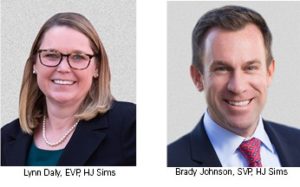 Lynn Daly joins Sims as Executive Vice President in its new Chicago location with 30+ years of experience working with non-profit organizations in financing. Daly was acting head of Senior Living Investment Banking at BB&T Capital Markets, where she managed BB&T’s senior living relationships in the Midwest, facilitating financings of $1.3+ billion. Prior to BB&T Capital Markets, Daly spearheaded the Catholic Initiative within senior living investment banking for Ziegler, and served as Head of Allied Irish Bank’s Midwest region. Daly earned a BS in economics from Kalamazoo College, and an MBA from Northwestern University’s Kellogg Graduate School of Management.
Lynn Daly joins Sims as Executive Vice President in its new Chicago location with 30+ years of experience working with non-profit organizations in financing. Daly was acting head of Senior Living Investment Banking at BB&T Capital Markets, where she managed BB&T’s senior living relationships in the Midwest, facilitating financings of $1.3+ billion. Prior to BB&T Capital Markets, Daly spearheaded the Catholic Initiative within senior living investment banking for Ziegler, and served as Head of Allied Irish Bank’s Midwest region. Daly earned a BS in economics from Kalamazoo College, and an MBA from Northwestern University’s Kellogg Graduate School of Management.
“We are so thrilled to welcome Lynn Daly to the HJ Sims family. Lynn is a well-respected and nationally recognized thought leader in the senior living sector and the perfect leader to grow our presence in the Midwest and to work with our team as we continue to expand throughout the US. Lynn’s extensive experience as both a senior commercial and investment banker, along with her integrity, deep knowledge, and client-centered approach, are vital characteristics and values that will guide our clients and business partners through these challenging times,” said Aaron Rulnick, Managing Principal, Sims.
Brady Johnson joins Sims as Senior Vice President in its new west coast office, in Orange County, CA. Previously with Hunt Real Estate Capital, Johnson was responsible for real estate debt originations for seniors housing and healthcare properties. He helped establish the firm’s seniors housing real estate lending platform, including a proprietary bridge loan program and expansion of the firm’s agency and HUD financing capabilities. Johnson closed the firm’s first Fannie Mae seniors housing loan, followed by its first seniors housing Freddie Mac loan. Prior to joining Hunt, Johnson served as Director of Seniors Housing & Healthcare at RED Capital Group, and served with GE Capital in various commercial finance roles. Johnson earned an MBA from Thunderbird School of Global Management and Bachelor’s degrees (Economics and Spanish) from the University of Utah.
“We are excited to welcome Brady Johnson to the Sims family. Brady will help establish our west coast presence serving for-profit and non-profit senior living clients. Brady’s broad experience in FHA, Fannie Mae, Freddie Mac, mezzanine and senior housing finance, and his focus on achieving the best solutions for his clients make him a great asset,” said Jeffrey Sands, Managing Principal, Sims.
In late 2019, Sims expanded its Private Client team, adding an office in Jupiter, FL, housing a three-person advisory team, as well as a senior partner of Sims Energy. HJ Sims’ Puerto Rico private client office moved its Guaynabo headquarters to a larger space in Metro Office Park. The spacious quarters enable the team to better host clients, while the expansion reinforces Sims’ established presence and growth on the island.
HJ Sims Closes Financings for Lenbrook, MRC Manalapan; Partners with Voralto for Acquisition
CONTACT: Tara Perkins, AVP Marketing Communications | 203-418-9049 | [email protected]
HJ Sims Closes Financings for Lenbrook, MRC Manalapan; Partners with Voralto for Acquisition
FAIRFIELD, CT– HJ Sims (Sims), a privately held investment bank and wealth management firm founded in 1935, is pleased to announce the successful closing of three transactions.
Lenbrook, a life plan community in Atlanta, GA, pursued financing for its recent Kingsboro at Lenbrook expansion. After a successful 2016 refinancing and a 2018 pre-development financing, Lenbrook again retained Sims to manage the financing process for the $107 million project. A priority of Lenbrook’s was to maximize the ability to deleverage the debt of the financing without penalty. The entrance fee debt was maximized and the long-term debt amortized while permitting early repayment from turnover entrance fees.
Sims coordinated a request for proposals to gauge interest in both the entrance fee and long-term debt. Due to the COVID-19 impact on bond markets and conduit bond issuers, Sims coordinated with the board and management of Lenbrook to pivot the transaction from tax-exempt financing consisting of bank short-term debt and long-term fixed rate bonds to taxable all-bank financing while closing early and achieving Lenbrook’s goal of maximizing deleveraging while maintaining flexibility. Fitch assigned a BBB- rating with stable outlook.
In Monmouth County, New Jersey, MRC Manalapan (MRC) is developing an assisted living and memory care community. MRC principals (and LV Development) collaborated with Springpoint Senior Living (Springpoint) to arrange the project and contracted with Springpoint to operate the community (Springpoint at Manalapan) under a long-term lease. Sims was engaged to implement debt financing supplemented by equity provided by the MRC principals.
Following a Sims-led solicitation, Peoples United Bank was selected to provide $14.3 million of taxable senior debt financing, incorporating a construction/mini-perm structure with a five-year balloon maturity. The loan includes tiered-interest rate pricing with reductions in loan credit spread following progression from construction, opening and stabilization. Primary security includes a revenue pledge and property mortgage. Supplemental security includes dual guarantees provided by the MRC principals and succeeded at completion by a limited tenant guaranty. Sims, Peoples and the financing team worked diligently with the MRC principals to secure final approvals, successfully closing in mid-May 2020.
Established in 1977 and headquartered in Houston and Dallas, TX, Voralto is a 42-year-old senior housing owner/operator with a combined 120+ years of experience in the senior housing industry. Committed to growing the company through strategic acquisitions and new developments, Voralto currently owns/operates 8 assets totaling 590 beds in TX and GA. Sims was approached by Voralto to provide equity for the acquisition of an assisted living and memory care community in northern TX. Voralto’s business plan included the implementation of operational changes.
Sims formed a joint venture with Voralto to acquire the community. Sims’ equity provided liquidity to overcome any short-term performance issues resulting from COVID-19 and time to implement the business plan.
Scheduled to close in March, Sims and Voralto overcame challenges from COVID-19. Drawing from expertise of its bankers and investors, Sims underwrote Voralto’s business plan and provided a customized solution.
Financed Right®:
Non-profit: Aaron Rulnick: [email protected] | For-profit: Jeff Sands: [email protected]
HJ SIMS: Founded in 1935, HJ Sims is a privately held investment bank and wealth management firm, headquartered in Fairfield, CT, with nationwide locations. www.hjsims.com. Investments involve risk, including loss of principal. This is not an offer to sell or buy any investment. Past performance is no guarantee of future results. Member FINRA, SIPC. HJ Sims is not affiliated with Lenbrook, MRC Manalapan, Voralto Funding I. Facebook, LinkedIn, Instagram Twitter.
HJ Sims Expands Investment Banking Team to West Coast, Midwest; Grows Private Client Team in Florida, Puerto Rico
CONTACT: Tara Perkins, AVP Marketing Communications | 203-418-9049 | [email protected]
HJ Sims Expands Investment Banking Team to West Coast and Midwest; Grows Private Client Team in Florida and Puerto Rico
FAIRFIELD, CT– HJ Sims (Sims), a privately held investment bank and wealth management firm founded in 1935, is pleased to announce the addition of two senior bankers as the firm expands with the opening of new offices in the Midwest and on the west coast.
Lynn Daly joins Sims as Executive Vice President in its new Chicago location with 30+ years of experience working with non–profit organizations in financing. Daly was acting head of Senior Living Investment Banking at BB&T Capital Markets, where she managed BB&T’s senior living relationships in the Midwest, facilitating financings of $1.3+ billion. Prior to BB&T Capital Markets, Daly spearheaded the Catholic Initiative within senior living investment banking for Ziegler, and served as Head of Allied Irish Bank’s Midwest region. Daly earned a BS in economics from Kalamazoo College, and an MBA from Northwestern University’s Kellogg Graduate School of Management.
“We are so thrilled to welcome Lynn Daly to the HJ Sims family. Lynn is a well-respected and nationally recognized thought leader in the senior living sector and the perfect leader to grow our presence in the Midwest and to work with our team as we continue to expand throughout the US. Lynn’s extensive experience as both a senior commercial and investment banker, along with her integrity, deep knowledge, and client-centered approach, are vital characteristics and values that will guide our clients and business partners through these challenging times,” said Aaron Rulnick, Managing Principal, Sims.
Brady Johnson joins Sims as Senior Vice President in its new west coast office, in Orange County, CA. Previously with Hunt Real Estate Capital, Johnson was responsible for real estate debt originations for seniors housing and healthcare properties. He helped establish the firm’s seniors housing real estate lending platform, including a proprietary bridge loan program and expansion of the firm’s agency and HUD financing capabilities. Johnson closed the firm’s first Fannie Mae seniors housing loan, followed by its first seniors housing Freddie Mac loan. Prior to joining Hunt, Johnson served as Director of Seniors Housing & Healthcare at RED Capital Group, and served with GE Capital in various commercial finance roles. Johnson earned an MBA from Thunderbird School of Global Management and Bachelor’s degrees (Economics and Spanish) from the University of Utah.
“We are excited to welcome Brady Johnson to the Sims family. Brady will help establish our west coast presence serving for-profit and non-profit senior living clients. Brady’s broad experience in FHA, Fannie Mae, Freddie Mac, mezzanine and senior housing finance, and his focus on achieving the best solutions for his clients make him a great asset,” said Jeffrey Sands, Managing Principal, Sims.
In late 2019, Sims expanded its Private Client team, adding an office in Jupiter, FL, housing a three-person advisory team, as well as a senior partner of Sims Energy. HJ Sims’ Puerto Rico private client office moved its Guaynabo headquarters to a larger space in Metro Office Park. The spacious quarters enable the team to better host clients, while the expansion reinforces Sims’ established presence and growth on the island.

HJ SIMS: Founded in 1935, HJ Sims is a privately held investment bank and wealth management firm, headquartered in Fairfield, CT, with nationwide locations. www.hjsims.com. Investments involve risk, including loss of principal. This is not an offer to sell or buy any investment. Past performance is no guarantee of future results. Member FINRA, SIPC. Facebook, LinkedIn, Instagram Twitter.
Gift of Life: Recap from 17th Annual Late Winter Conference
Gift of Life (GOL) joined our 17th Annual HJ Sims Late Winter Conference February 25-27 in San Diego. GOL was represented by Alicia Lorio, a leader of their Young Professionals Committee in Orange County; and GOL blood stem cell donor, Alec Nadelle.
Alicia shared GOL’s history and spoke about the importance of growing the GOL stem cell registry to give second chances to those afflicted by blood and bone cancer. Before introducing Alec, Alicia shared how individuals can get involved with GOL and increase the number of those within the registry by encouraging individuals to swab their community and swab at their workplace.
Next, Alec shared his experience with GOL. He donated blood stem cells in November 2012 to a (then 71-year-old) woman battling a fast-moving form of Leukemia. The presentation left attendees feeling truly moved.
The team was excited to share an update about the amazing CSR partnership that HJ Sims and GOL have shared during the last two years.
From running fundraising drives to sponsoring the Steps for Life events to helping underwrite equipment for a
new state-of-the-art Stem Cell Collection Center located in Boca Raton, HJ Sims continues to be honored to support GOL and their mission to cure blood cancer through marrow and stem cell donations. GOL has facilitated nearly 3,600 transplants since its inception.
For more information, visit www.giftoflife.org
HJ Sims 2019 Late Winter Conference Recap

Thank you!
On behalf of the entire HJ Sims Investment Banking team, we want to thank you for attending the 16th Annual HJ Sims Late Winter Conference at the Sheraton Sand Key Resort in Clearwater Beach, Florida. We at Sims are proud of our commitment to furthering conversation about financing methods & operating strategies in the Senior Living Industry. Bringing together a dynamic group of speakers from Non-Profit and Proprietary Senior Living Providers, as well as outside experts with thought-provoking views, it is our goal to have provided profound insight and an invaluable forum for exchanging ideas and information.
Post-Conference Follow-Up
Our Conference Recap provides comprehensive coverage of the many sessions and event highlights from the 2019 HJ Sims Late Winter Conference.
You can help us make the next Late Winter Conference even more successful by completing this survey. We very much appreciate your input. Thank you.
In case you missed it, below are the details from our 16th Annual HJ Sims Late Winter Conference.
Agenda
Schedule and activities
Full conference brochure
Roster of conference speakers and their biographies
Education sessions presentations
Photos
We invite you to view the many beautiful photos from our conference. Peruse the galleries below and visit the HJ Sims Facebook, Instagram, LinkedIn or Twitter pages.
For attendees who updated their professional headshots at the “Headshot Hub,” our photographer, Thee Photo Ninja, has posted all headshots in this gallery. Login using the password, sandkey. To download your image, simply click on the photo, and click the download button at the top of the browser.
Activities Photos
We invite you to view photos from the 2019 Late Winter Conference. Then, either view the thumbnails or to view the images as larger icons, click on the image and scroll through.
Shown below are highlights from our recreational activities: Golf Tournament at Innisbrook, Chocolate Making & Tasting at William Dean Chocolates, Sailing on the Kai Lani catamaran and the Schooner Clearwater, Fishing at Hubbard’s Marina and Biking through Dunedin.
While the weather may not have cooperated, it looks like we all managed to have a fun time.
Education Photos
Networking Photos
Corporate Social Responsibility: Gift of Life
Gift of Life (GOL) representatives attended our conference as part of a special presentation at our Opening General Session, which included an introduction to HJ Sims’ Corporate Social Responsibility (CSR) program by Tara Perkins, Assistant Vice President Marketing Communications, HJ Sims, and a screening of the Gift of Life/HJ Sims partnership video. Sharon Kitroser, Corporate and Community Relations Officer, GOL, delivered a short history and shared the donor story of Ryan Corning. Ryan then took the stage to discuss his heartwarming experience—there was not a dry eye in the house! Sharon, Ryan and other GOL staff remained on-site throughout the conference —swabbing, distributing information and answering questions. It was a wonderful experience to share with our attendees.
Kitroser says, “It was truly an honor to join HJ Sims at their Conference. GOL presented our mission to save lives through marrow and stem cell donation, and shared how our partnership has come to life in the past 10 months. We introduced one of our heroic donors…Ryan Corning of Land O’Lakes, Florida who saved 47 year-old New Yorker Julio Rivera, who has survived leukemia thanks to his transplant. Attendees were excited to hear more about how their teams can swab their cheeks to save a life. Plus, more than 30 individuals joined the registry right there at the conference!”
Save the Date
Please save the date for next year, the 17th Annual Sims Late Winter Conference at the InterContinental in San Diego, California.
Thanks again!
Market Commentary: A Matter of Degrees
The average lifespan back in 1868 was approximately 38.3 years. People were shorter and thinner and suffered all manner of chronic and infectious diseases. Dr. Carl Reinhold August Wunderlich, a German physician, psychiatrist, and medical professor was running the hospital at Leipzig University at that time. In the process of observation and diagnosis, he took the axillary temperatures of 25,000 patients using a foot long thermometer that required 20 minutes to register. Based on the curves he patiently plotted, he determined that fever was not a disease but a symptom, and that the normal human body temperature is 98.6 degrees Fahrenheit. His is the measurement that we have since used to determine the gravity of illness in everyone from newborns to centenarians. But the human body has changed over the years and researchers have been disputing the Wunderlich axiom since the early 1990’s. The latest of two dozen modern studies is from Stanford University, where researchers finds that the new normal is closer to 97.5 degrees. But, as one might imagine, revising the cherished dictums on clinical thermometry is a not a speedy process.
In Wuhan, China and in clinics, hospitals and doctor’s offices around the word, degrees matter. Temperatures of 99.1 or higher are raising alarms as possible symptoms of a coronavirus that causes a lethal form of pneumonia. Dry cough, muscle pain and fatigue may also present over the course of a week before an infected person feels ill enough to seek medical care. At this writing, there are 4,585 confirmed cases in 18 countries and the death toll has reached 106. The rapid spread of the disease has spurred herculean efforts on the part of health professionals and chilling fears among travelers and investors who recall the spread of severe acute respiratory syndrome (SARS) in 2002 and the Ebola virus in 2014.
Global financial markets, which have already withstood the shocks of U.S.-Iran hostilities, the U.S-China trade conflict, the approach of Brexit, and the impeachment trial of a U.S. president in the first three weeks of the New Year, became roiled again on Monday. Even though health officials remind us that the influenza has resulted in 12,000 to 79,000 deaths annually since 2010, reports on the spread of a mysterious virus caused a one-day selloff in stocks on exchanges in Asia, the U.S. and Europe. Bloomberg reported that the slide wiped about $1.5 trillion off the value of world stocks in one week. The Dow erased the entire month’s gains and the Russell 2000 fell 1.5%. Oil prices fell 13% to $53.14 per barrel and gold gained $57.41 an ounce. Money quickly shifted to bonds and the dollar until Tuesday, when traders viewed the degree of global containment effort as likely to prevent a major economic loss. So far in 2020, the 2-year Treasury yield at 1.44% is up 12 basis points. The 10- and 30-year yields have plunged 31 basis points to 1.60% and 2.05%, respectively. Alongside governments, 10-year Baa-rated corporate bond yields have fallen 29 basis points and both the 10- and 30-year AAA municipal bond benchmark yields are down 26 basis points to 1.18% and 1.83%.
Markets focused on the possible implications of an epidemic in China leading to a global health emergency would otherwise be obsessed with Thursday’s Gross Domestic Product number, Friday’s British farewell to the European Union, wagers expected to total $6 billion on Sunday’s Super Bowl, and Wednesday’s meeting of the Federal Open Market Committee, the first such gathering of the year. Voters this year present as a few degrees more dovish, as the Fed Presidents from Kansas City and Boston relinquish their seats to the Fed Presidents from Cleveland, Philadelphia, Dallas and Minneapolis. There are still two vacancies for the Board of Governors and the nominees await Senate confirmation. Investors will watch the press conference and take the proverbial temperature of the Chair and Committee members on inflation, repurchase agreements, and the virus. Futures trading reflects only a 12% chance of a rate hike.
The municipal market is expected to see only $5.7 billion of new issues this week and the 30-day visible supply totals a mere $10.1 billion while redemptions and maturities are expected to add $25.8 billion of cash to the yearlong manhunt for tax-exempt and taxable municipal bonds. The largest financings happen to be for hospitals in Florida and New York, and there are several other health system issues in North Carolina, Indiana and Ohio on the slate. In the high yield space, the Port of Beaumont, Texas has a $265 million non-rated issue with tax-exempt and taxable series for the Jefferson Gulf Coast Project, Howard University is bringing a $145.4 million BBB-minus rated taxable refunding with a corporate CUSIP. And the California Enterprise Development Authority has a $9.2 million Ba2 rated financing for the Academy for Academic Excellence.
From the world of academia, Dr. Matthew Lieberman will be a keynote speaker at the 17th Annual HJ Sims Late Winter Conference next month in San Diego. Professor Lieberman holds degrees from Rutgers and Harvard and directs the Social Cognitive Neuroscience Lab at UCLA, one of the first labs to combine social psychology and neuroimaging. He measures and maps brain activity to demonstrate how we are wired to have a natural preference for switching from non-social to social tasks, how putting our feelings into words can have a soothing effect on those emotions, and how we might be able to help people who disagree come together without being disagreeable. He contends that our need to connect with others is just as important, if not more, than our basic need for shelter and food. So we invite you to hear his remarks, join us at the InterContinental Hotel, savor dinner at the San Diego Zoo, and enjoy a tremendous networking opportunity by registering at this LINK.
Market Commentary: On Magic Mountain and Capitol Hill
Government, business, academic, humanitarian and other leaders and dealmakers from 117 countries gather this week at the ski resort in Davos-Klosters, Switzerland for the 50th annual invitation-only meeting of the World Economic Forum. This year’s theme is “Stakeholders for a Cohesive and Sustainable World” and the thousand-odd journalists covering the events on the “Magic Mountain” will once again be taking the proverbial temperature of the global elite on topics such as cybersecurity, climate, e-commerce, inequality, reskilling, rural mobility, and the future of healthcare. The combined wealth of attendees, on a per-square-foot basis, will likely set a new record and the menu as well as the agenda will be a topic of lively debate. Half of the 70,000 meals for participants, staff and security will feature a plant-rich flexitarian plates such as broccoli mousse with toasted pignoli, and maple-smoked haloumi cheese with mint dust.
President Trump is delivering a keynote speech to the Forum at this writing. In his scheduled meetings with the Presidents of the European Commission, Iraq, Switzerland and Kurdistan, and the Prime Minister of Pakistan, he is accompanied by his Secretaries of Treasury, State and Commerce, his U.S. Trade Representative, and Deputy Chief of Staff for Policy Coordination. While they represent the nation overseas, the U.S. Senate has convened on Capitol Hill in Washington for only the third time in history to sit as a court of impeachment. The first day of the trial began on Tuesday afternoon with votes on rules to govern the proceedings. Senators will be living on snacks in the cloakroom for several weeks of marathon proceedings while reviewing the facts and reflecting the proverbial temperature of the nation on the charges against the President. At this point, no one expects conviction and removal, but the political process is back in progress and has been known to have some twists and turns.
The Chief Justice of the Supreme Court is a thousand feet away from colleagues concurrently considering a long calendar of unrelated cases while he is required by the Constitution to preside over an entirely separate branch of government, again for only the third time in history. The rest of the country nevertheless proceeds with more routine matters. At the Federal Reserve, the Open Market Committee prepares for its first monetary policy meeting of the year. The Treasury is auctioning $78 billion of 3- and 6-month bills and $80 billion of 4- and 8-week bills and planning to re-issue 20-year bonds. The Centers for Disease Control is immersed in identifying and preventing the spread of the deadly new Wuhan coronavirus. The Census Department has kicked off the decennial population count in rural Alaska. Democratic voters in Iowa are getting ready to caucus.
On Wall Street and at Davos, investors are sitting on a lot of cash but many are very confused about when and where to put it to work. Last year, it paid to buy almost anything. This year, there are new concerns about the sustainability of the 121-month U.S. economic expansion, the 30-year bond market rally, the 11-year bull market in stocks, and geopolitical tensions that spiked at the start of the new decade. It is unclear how much help central banks can be in a future economic downturn. Trade conflicts persist, even after the Phase 1 agreement was signed with China and the Congress approved the Administration’s new trade deal with Canada and Mexico. There is still plenty of uncertainty remaining with Brexit and not much apparent reward for taking risks in nearly any global sector. Rates remain at historic lows and asset prices are elevated across the board. Cash may be “trash” in the eyes of some fund managers, but 10-year sovereign bonds yields in Germany, the Netherlands, Switzerland and Japan are still negative as are many returns after adjusting for inflation.
At the midway mark in this first month of the year, the 2-year Treasury yield stands at 1.55% and the AAA municipal general obligation bond yields 0.90%. The 10-year Treasury yield is down 9 basis points on the year to 1.82% while the comparable high grade muni yield is 15 basis points lower at 1.29%. The 30-year Treasury yields 2.28%, down 10 basis points from the start of the year, and the 30-year muni yields 1.94%, 15 basis points lower. Baa corporate bond benchmark yields are down 13 basis points to 3.57%. The Russell 2000 Index is up nearly 2% to 1,699, oil prices are down 4.1% to $58.54, and gold prices have risen 2.3% to $1,557 an ounce. The normal ratios of stocks and bonds, municipal bonds and Treasuries, are askew. There are also increasing pressures for more socially conscious or green investing and attention to environmental credit risks and concerns about where markets are heading in this era of central bank interventions, high budget deficits and extraordinary debt levels.
At the 17th Annual HJ Sims Late Winter Conference next month in San Diego, we are fortunate to have Robert Genetski, as one of our keynote speakers. “Dr. G” is one of the nation’s leading classical economists who takes the voodoo out of the science and provides valuable insights on the impact of policy on growth. He is a Blue Chip interest rate forecaster who will endeavor to help us anticipate where we are heading as borrowers, investors, employers and citizens. We invite you to join us and participate by registering at this LINK.
The municipal bond market is still riding high thanks to favorable technical factors of supply and demand. Fund flows have been positive for 54 weeks; $5.1 billion of new investments in muni bond funds were made in the last two weeks. Bloomberg just reported that the last time tax-exempt yields were this low, Dwight Eisenhower was president and Elvis Presley was releasing his second studio album. Munis are outperforming the Treasury market and Muni-Treasury ratios in the 1-15 year range are at record 35-year lows. This week, the primary market calendar totals $7.1 billion, up from $5.4 billion last week. The high yield calendar includes nearly a dozen deals, including our $41.5 million revenue and refunding issue for Henry Ford Village, a continuing care retirement community with 852 independent living units, 96 assisted living units, and 89 licensed nursing care beds. The non-rated bonds are being issued by the Economic Development Corporation of the City of Dearborn, Michigan.
Market Commentary: On the Cusp of Another New Year
In Chinese folklore, the Jade Emperor decided that there should be a way of measuring time and settled on a 12-year calendar. To designate the years, he decided to host a competition for naming rights. On his birthday, he called for a swimming race and invited all animals to participate. The first twelve to cross a wide river would win a spot on his new zodiac calendar. So the great race began and the quick-witted Rat convinced the kind and powerful Ox to give him a ride on his back. The Ox moved rapidly into the lead but, just as he reached the river bank, the Rat jumped off and finished ahead of him, earning his position as the first zodiac sign. The peeved Ox was followed by the Tiger, Rabbit, Dragon, Snake, Horse, Goat, Monkey, Rooster, Dog and Pig, the final order of the zodiac.
Rats have long symbolized wealth and surplus in Chinese culture. They are said to be savers, but lack courage and can be stingy. Their love for hoarding can sometimes cause them to waste money on unnecessary things. Those born in the Year of the Rat are considered clever and industrious. The most recent Years of the Rat were in 2008, 1996, 1984, 1972 and 1960, half of which were good for stocks, half for bonds, none good for both. The next one begins on January 25, the Lunar New Year, which always occurs on the second new moon after the winter solstice. Feng shui grand masters see this year as the start of a new age. Many expect slowing growth, radical positions, impassioned protests, and more tension between countries. Some see great opportunities for wealth with best performances coming from energy, entertainment, land development, technology, and banking.
China’s Vice Premier Liu He, born in the Year of the Dragon in 1952, will be in Washington on Wednesday to sign a partial trade deal with President Trump, born in the Year of the Dog in 1946. The trade war between the two superpowers has generated much uncertainty for global investors for the last two years. And although markets cheer the accord, and relief to some businesses comes with the Phase One truce, for the time being tariffs continue to impact chemical makers, apparel retailers and auto parts manufacturers. A substantial percentage, perhaps close to two-thirds, of everything Americans buy from China will still be tariffed.
2020 in the Gregorian calendar is a leap year. It is a decennial census year, a presidential election year, and a year in which the United Kingdom and Gibraltar are scheduled to leave the European Union. Tokyo hosts the Summer Olympics, the World Expo opens in Dubai, and NASA launches a rover mission to study the habitability of Mars. The financial markets will focus on the eight scheduled meetings of the Federal Open Market Committee, beginning on January 28, but will also pay close attention to the Democratic primaries which start on February 3 and conclude with the convention in Milwaukee on July 16.
The new trading year began with the targeted U.S. MQ-9 Reaper drone airstrike that killed Iran General Qassem Soleimani followed by the deployment of 3,500 additional U.S. troops to the Middle East. Markets were roiled and investors fled to safe havens out of concern for retaliations and an escalation of conflict. Once Iran appeared to stand down, tensions very quickly faded and the U.S. rallies resumed. At this writing, the Dow is up 368 points since the start of the year, the S&P 500 is up 57 points, and the Nasdaq is up 301 points or 3.4%, while the Russell 2000 Index of small cap companies manufacturing or producing goods in the U.S. is basically flat at 1,668. Oil prices spiked briefly but have settled in the $59 range, down nearly 5% in 2020. Gold prices have gained $27 an ounce and stand at $1,549.
The bond market continues its 30-plus year-long rally, buoyed further by the temporary flight to quality. Although the 2-year Treasury yield is up 2 basis points on the year to 1.58% at this writing, the 10-year benchmark has fallen 7 basis points to 1.84% and the 30-year yield is down 8 basis points to 2.30%. $8.19 billion was added to high grade corporate bond funds in the opening week of 2020, and high yield funds reported inflows of $1.12 billion. Ten-year Baa corporate bond yields have dropped 11 basis points to 3.59%.
Municipal bonds are still on a tear. Yields, as measured by the AAA general obligation MMD scale, have compressed by another 10 basis points. The 2-year is at 0.94% and the 10-year at 1.35%. The 30-year benchmark at 1.98% is 105 basis points lower than where it stood one year ago. Continuing the 53-week pattern, municipal bond mutual fund inflows continue to set new records. Investors added an astonishing $2.89 billion into state and local government debt funds during the first, traditionally sleepy, week of January. More than $612 million was added to high yield funds.
During the first full week of issuance, $5.9 billion of bonds were issued and the high yield muni sector saw little activity. The California School Finance Authority sold $32.3 million of non-rated revenue bonds for Arts in Action Charter Schools that came with a 40-year final maturity priced with a 5.00% coupon to yield 3.67%. And the Build NYC Resource Corporation issued $9.3 million of non-rated revenue bonds structured with a 30-year term bond priced at 5.00% to yield 4.00%. This week’s $6.6 billion slate include a $23.5 million non-rated South Carolina Jobs-Economic Development Authority deal for Hilton Head Christian Academy. The 30-day visible supply of visible bonds totals $12.3 billion. On the cusp of a new calendar used by one quarter of the world’s population, we join in wishing all a Happy New Year.
Market Commentary: Welcome to the Next in the Series of Roaring ’20’s
Two hundred years ago in the Era of Good Feelings, Maine and Missouri were admitted to the Union, the Territory of Florida was ceded to the United States by Spain, the first train began operating over the Granite Railway in Massachusetts, the first camera photograph was taken in France and the first modern stock market crash occurred in London. President James Monroe delivered a speech to Congress in which he warned leaders in Europe that any future attempt to exert influence in the Western Hemisphere would be seen by the U.S. as a threat to its security. Due to an Electoral College stalemate in which none of the four Democratic-Republican candidates won a majority, the presidential election of 1824 was the first and only one in history decided in the House of Representatives under the 12th Amendment. John Quincy Adams of Massachusetts, became our sixth President after earning only 31% of the popular vote. His opponent, Andrew Jackson of the Carolinas, a former U.S. Army General and justice on the Tennessee Supreme Court who had served in both chambers of Congress, had the plurality of the popular vote at 41%, and eventually succeeded Adams in 1829. President Jackson opposed paper money and demanded that the government be paid in silver and gold coins. He believed that the central bank at that time, the Second Bank of the United States, lacked constitutional legitimacy and was a corrupt institution, dangerous to American liberties. He vetoed a bill re-chartering the bank and was re-elected on an anti-bank platform.
One hundred years ago during the decade of the Roaring Twenties, communism and fascism spread in Europe, the U.S. placed harsh restrictions on immigration, and prohibition took effect. Republican Warren Harding of Ohio campaigned for a “return to normalcy” after World War I and won 60% of the popular vote and 404 votes in the presidential election of 1920, the first in which women had the right to vote in all 48 states. “Winnie’s” Vice President, Republican Calvin Coolidge of Massachusetts, won every state outside of the south in the 1924 race for the Oval Office but chose not to run for re-election. “Silent Cal’s” Republican Secretary of Commerce, Herbert Hoover of California, became the first president born west of the Mississippi River when he gained 444 electoral votes and 58% of the popular vote. The Electoral Colleges at the time were heavily influenced by certain gridlock in Congress. For the only time in American history, legislators failed to agree on a reapportionment plan following the 1920 Census. Representatives from rural districts were fearful of losing power to the cities, and worked to delay and block consideration of the required enabling legislation. So, the distribution of Congressional seats from the 1910 Census remained in effect for 23 years. The decade ended — as we know — with the Wall Street Crash of 1929.
January 1, 2020, marked the start of a new decade in this century, but we are clearly linked to the ’20s of our past. On the economic front, our economy continues to roar and its powerful engine, the consumer, feels good despite concerns for the intensifying conflict with Iran and rising food and gas prices. We are in a presidential election year where the Electoral College may once again produce results that differ from the popular vote. The composition of the College will change if Congress approves reapportionment this December based on some of the significant population shifts that have occurred; as a result of this decennial Census, Florida is likely to receive several new U.S. House seats at the expense of California, Illinois, New York and/or Minnesota. We live in an era of major threats to our security and the President has an emerging doctrine. The central bank has become a real lightning rod for him, but his Treasury Department delivers approximately 21 million paper notes a day to the Federal Reserve. The price of gold increased from $19.39 in 1820 and $20.67 in 1920 to $1,575.80 per ounce today.
Not everything was worth a cheer at the start of the New Year. Over the course of the last decade, student debt increased by 108%, auto loan debt climbed by 82%, credit card debt was up by 10.8% and mortgage debt rose 6.7%. The federal debt stood at $23 trillion, and the budget deficit for FY19 exceeded $984 billion. Global debt topped $250 trillion, more than three times the combined gross domestic product. The Fed held $4.1 trillion of assets and the collective balance sheet assets of the Fed, the European Central Bank, the Bank of Japan and Bank of England totaled 35.9% of their nation’s GDPs. The investor’s Wall of Worry included geopolitical tensions in the Middle East and North Korea, political polarization at home, trade conflicts with China, political and fiscal policies in Europe, market volatility, a virtual rolling impeachment process, natural disasters, corporate and municipal defaults leading to massive fund redemptions, price cuts and market illiquidity, regulatory and legislative uncertainty, underfunded pensions and other post-employment benefits.
The last decade ended with champagne and fireworks-filled celebrations by those in the stock and bond markets. The U.S. enjoyed 120 consecutive months of expansion, and states reported nine consecutive years of revenue gains. For the first time in 70 years, we became a net exporter of petroleum. Unemployment at 3.50% was at a 50-year low, well below the 9.70% reported in January of 2010. The number of unemployed persons per job opening was 0.8 versus 5.8 in 2009 and the labor force participation rate for prime age workers (25-64) was 82.8%, the highest in 10 years. The S&P 500 Index gained 30% last year and the Bloomberg Barclays Bond Index rose 15%. Investors rode out unprecedented monetary interventions, negative interest rate policies which produced a high of $18 trillion of negative yielding sovereign bonds, algorithmic trading, artificial intelligence, cloud technology, cyberattacks, the introduction of blockchain and cryptocurrencies, sovereign near-defaults, major changes in tax and health care laws, taper tantrums, debt ceiling and government shutdown crises, power shifts in the Congress and White House, media-induced frenzies over the prospect of higher rates, recession and widespread municipal defaults. Investing has been made easier with online access, index funds, robo-advisors and zero-commission trends. During the past decade, the Dow Jones Industrial Average gained 18,110 points and the Nasdaq Composite Index rose 6,703 points. Oil prices fell $18.30 a barrel while gold prices rose $281 an ounce. The 10-year Treasury yield decreased by 192 basis points from 3.83% to 1.91% and the spread between the 2-year and 10-year shrank from 270 basis points to 35 basis points. The 10-year Baa-rated corporate bond benchmark fell 221 basis points from 5.91% to 3.70%. Bond market volatility, as measured by the CBOE/CBOT US Treasury Note Volatility Index, declined from 7.01 to 4.13.
In the municipal bond sector, the 10-year AAA municipal general obligation bond yield plummeted by 156 basis points from 3.00% to 1.44% between 2010 and 2019. The spreads between 2-year and 10-year yields narrowed from 242 basis points to 40 basis points. The slope of the yield curve has rarely been so flat since 1964. Issuance exceeded $400 billion four times during the decade, including $421 billion in 2019. Last year, there were $90 billion of net inflows into muni mutual funds over 51 consecutive weeks, and throughout the past decade, investors have added a net of $366 billion, increasing assets to $803 billion. Demand for tax-exempts was predictably highest in the high-tax states of New York, New Jersey, Connecticut, California and Massachusetts. Returns for the year averaged about 7.74%, with high yield and long-dated bonds reporting some of the best returns. Taxable municipal bond issuance doubled last year to $67 billion, primarily due to the number of advance refundings under the 2018 tax laws. The 30-year AAA rated taxable municipal bond benchmark closed the year at 3.20%, which looked mighty attractive versus the German 30-year sovereign yield which finished the year at 0.349%, the French at 0.922%, and the Italian at 2.465%.
U.S. fixed income markets total $41 trillion with $906 billion of bonds traded daily and annual issuance approximating $8.1 trillion in 2019. There are approximately $15.9 trillion of U.S. Treasuries, $9.4 trillion of corporate bonds, and $3.8 trillion of municipal bonds outstanding. $602 billion of Treasuries, $11 billion of municipals, and $35 billion of corporates are traded every day. Monthly issuance in 2019 averaged $234 billion for governments, $124 billion for corporates and $34 billion for munis. U.S. equities have a $30 trillion market capitalization, with 6.8 billion shares traded daily and $228 billion of underwriting activity.
Despite all the failed forecasts for 2019, economists and analysts of all stripes have looked into the crystal ball and made their predictions for 2020; some have dared to go out as far as five years. The predictable wild cards are central bank policy mistakes, Brexit surprises, convention and election outcomes, Census surprises, recession, weather-related disasters, oil price shocks, debt crises, trade war escalation and market corrections. In the municipal bond sector this year, we expect issuance to exceed $410 billion with perhaps $120 billion of refundings, and $85 billion of taxables. At least $288 billion of bonds will mature or are scheduled to be called and redemption totals are bound to grow with advance refundings. We have seen projections for the 10-year AAA muni yield to end the year as low as 0.8%. At this writing, the 10-year yield stands at 1.34% and the calendar for this first full week of January is estimated at $9 billion.
We welcome everyone back from the holidays and encourage you to share your predictions, interests and concerns with our sales, trading and banking staff this month. In the interim, we wish you a happy, healthy, and prosperous 2020.
Axxcess Platform Announces Partnership with HJ Sims
HJ SIMS: Tara Perkins, AVP Marketing Communications, [email protected] | 203-418-9049
AXXCESS PLATFORM: Alexis Brock, Marketing and Communications, [email protected] | 866-217-5607
AXXCESS PLATFORM ANNOUNCES PARTNERSHIP WITH HJ SIMS
FAIRFIELD, CT— Axxcess Platform (Axxcess), an enterprise turnkey asset management platform, announced today a partnership with HJ Sims, a privately held investment bank and wealth management firm headquartered in Fairfield, CT. HJ Sims and Axxcess have partnered to deliver a suite of portfolio management technology for the HJ Sims private client wealth management team.
“We are thrilled about partnering with HJ Sims to equip their team with our asset management solution to help them continue to deliver a rich client experience. We are confident the HJ Sims team will find incredible value in our platform, which offers the tools and resources needed in one technology stack, further optimizing their client management approach,” says Michael Seid, CEO of Axxcess.
Founded in 1935 on Wall Street, HJ Sims is entrusted with $2.3 billion of assets under management. Herbert J. Sims, founder, was an innovative and revolutionary thinker with an imaginative and pioneering spirit. During the Great Depression, Herbert recognized opportunity to create jobs and support important infrastructure, such as county roads, natural gas systems, and bridges and causeways, through municipal financings. Today, HJ Sims supports individual investors, organizations, municipalities and institutions with expert wealth management, trading services and investment banking solutions.
HJ Sims will utilize the Axxcess platform as an end-to-end portfolio management tool, allowing their wealth management experts to serve their clients’ financial needs with a seamless and scalable approach–including aggregating accounts, identifying risk, analyzing holdings, modelling and blending investment strategies, and accessing third-party directed solutions.
“Partnering with Axxcess by incorporating their customized technology and sophisticated interface via a first-class portfolio management tool will help our advisory team deepen their client relationships. The comprehensive technology platform provided by Axxcess empowers us to revolutionize our client experience with open architecture and access to best in breed money managers,” said Dan Mullane, Managing Principal of HJ Sims.
ABOUT AXXCESS PLATFORM
Axxcess integrates third party investment managers alongside real estate, private equity, and hedged investments to create a unique UMA/TAMP Platform to transform your Wealth Management practice. The Axxcess Platform is built for the experienced Advisor looking to improve its current RIA Platform, or as an operational solution for a high caliber professional thinking of going independent and seeking a seamless transition. We offer Advisors open architecture, with a full array of wealth management and investment advisory services to move your practice upstream. Axxcess combines true alternatives like private equity, private credit, hedge funds and directed real estate alongside traditional SMA strategies.
Our focus is on 3c(1) and 3c(7) clients and the Advisors that serve them. If you are interested in providing a platform of services designed to move your business upscale, Axxcess is your solution. Contact: 866-217-5607 |https://axxcessplatform.com/
ABOUT HJ SIMS
Founded in 1935 on Wall Street, HJ Sims is a privately held investment bank and wealth management firm. HJ Sims is known as one of the country’s oldest underwriters of tax-exempt and taxable bonds, having raised $28+ billion for projects throughout the US. The firm is headquartered in Fairfield, CT, with nationwide investment banking, private wealth management and trading locations. Visit www.hjsims.com/ourstory. Visit www.hjsims.com/ourstory. Follow HJ Sims on Facebook, LinkedIn, Instagram and Twitter.
Investments involve risk, including the possible fluctuation of principal. Past performance is no guarantee of future results. HJ Sims is not affiliated with Axxcess Wealth Management. Member FINRA, SIPC.












